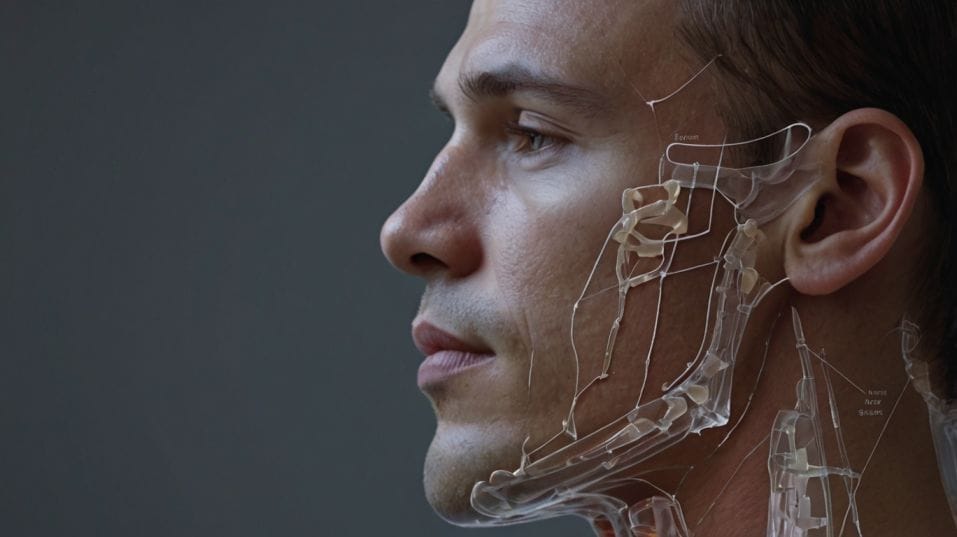How Your Jaw Position May Be Disrupting Sleep
Struggling with poor sleep despite good habits? Discover how your jaw position may be quietly wrecking recovery—and how to fix it tonight.

Ever wonder why you're still waking up tired, even after doing everything “right” for sleep? The culprit might be hiding in plain sight—your jaw.
Most people never think about jaw position, but it plays a powerful role in how deeply you sleep and how well you recover.
If your body stays in stress mode all night, it’s time to look beyond the basics. Here’s how one simple shift could unlock the sleep you’ve been missing.
Your Jaw: A Key Player in Nighttime Recovery
At first glance, the jaw seems like a background player—just a bone that helps you chew and talk. But structurally, it's tied into the quality of your breathing and how well your body transitions into deep, restorative sleep.
The jaw influences the position of your tongue, which directly affects your airway. If your jaw sits too far back during sleep, it can push your tongue toward the throat and partially block airflow.
You might not notice this happening, but your nervous system will. It senses the restriction and kicks your body into a low-level alert mode, even if you never fully wake up.
The result? Shallow sleep, reduced oxygen, and less physical and mental recovery. This is why you can spend eight hours in bed and still feel like you barely slept.

It’s Not Just Snoring: The Subtle Signs of Jaw-Related Sleep Disruption
Let’s make one thing clear: you don’t need to be snoring like a freight train or diagnosed with sleep apnea to have a jaw issue that’s ruining your rest. The signs can be quiet but consistent.
You might notice:
- Waking up with a dry mouth, tight jaw, or mild headache.
- Clenching or grinding your teeth at night.
- Feeling “wired but tired” in the morning—rested in theory, but foggy and unrefreshed in practice.
- Light, restless sleep with frequent tossing, especially on your back.
These are all hints that your airway isn’t staying fully open during the night. And jaw alignment is often the reason why.
When your jaw drops backward during sleep—especially in back-sleeping positions—it can pull the tongue into the airway space. The narrower the airway, the harder your body has to work to get oxygen.
Your sleep gets fragmented. You might not remember waking, but your body does. And it pays for it in poor recovery, lower focus, and unpredictable energy.
How Jaw Position Affects Your Breathing—and Your Brain
Every breath you take during sleep fuels vital body systems: tissue repair, hormone regulation, memory consolidation, and nervous system recalibration. Oxygen flow is non-negotiable.
When the airway narrows due to poor jaw position, breathing becomes inefficient. Your brain registers even minor obstructions and responds by releasing cortisol and micro-waking you to correct the problem.
This breaks the rhythm of deep sleep stages—the ones that matter most for full-body recovery.
Over time, this keeps your nervous system in a subtle fight-or-flight mode. Your heart rate variability drops. Your REM sleep gets clipped.
You start waking up stiff, irritable, or inexplicably anxious—even if your sleep tracker says you got “enough” sleep.
This is why elite athletes, performance-driven professionals, and sleep experts are now looking at the jaw as a frontline tool in optimizing rest.
The science is catching up to what many airway dentists have known for years: jaw posture isn’t cosmetic—it’s functional.
Simple Adjustments to Improve Jaw Alignment Tonight
You don’t need a mouthguard or surgery to start fixing this. Small, targeted shifts in your nightly routine can make a major difference.
Start by retraining your default jaw posture.
When you lie down at night, gently close your lips and let your teeth rest slightly apart. The tongue should sit against the roof of your mouth, just behind your front teeth.
This position supports a forward jaw and an open airway. It's called the "physiologic rest position," and it's the foundation of optimal sleep breathing.
Prioritize nasal breathing.
Mouth breathing changes your jaw mechanics and pulls everything downward. Use nasal strips, a humidifier, or gentle mouth tape to encourage nasal airflow.
You’re not forcing anything—you’re giving your body the conditions it needs to breathe better.
Rethink your sleep position.
Back sleeping tends to let the jaw drop backward. Try side-sleeping with your head and neck properly aligned.
Use a pillow that keeps your neck neutral—not pushed forward or tilted back. Your airway alignment starts at the base of the skull and runs all the way down.
Watch your evening jaw tension.
Evening clenching or subconscious teeth grinding can carry into the night.
Take five minutes before bed to relax your jaw—massage the masseter muscles near your cheeks or gently stretch the jaw with guided breathing. A calm jaw before bed sets the tone for a relaxed sleep state.
When to Get Expert Help
If you’ve already dialed in your sleep habits but something still feels off, it's time to consult a pro. Look for airway-aware dentists, sleep specialists, or myofunctional therapists.
These experts assess how your jaw, tongue, and facial structure are affecting your breathing—and they don’t just hand you a generic night guard.
They may recommend at-home tongue exercises to improve muscle tone or custom oral appliances that gently position the jaw forward to keep the airway open.
These aren’t the bulky devices from old-school sleep clinics. Modern solutions are discreet, personalized, and focused on restoring natural function.
Even a basic assessment can be eye-opening. Many people learn that their "normal" jaw posture is actually compromising their airflow every night—and correcting it gives them the best sleep they’ve had in years.
Final Thoughts
Your jaw is more than a facial feature—it’s a key to deeper sleep, better breathing, and sharper mornings. The position of your jaw while you sleep can either support your recovery or quietly sabotage it, night after night.
The good news? You don’t have to overhaul your life. A few simple tweaks to posture, breathing, and awareness can start unlocking better sleep right away.
Start tonight. Check your jaw posture. Keep your mouth closed, tongue up, and airway clear. Sleep like your performance depends on it—because it does.
You’ve optimized your lights, your mattress, your routine. Now it's time to optimize your jaw.




